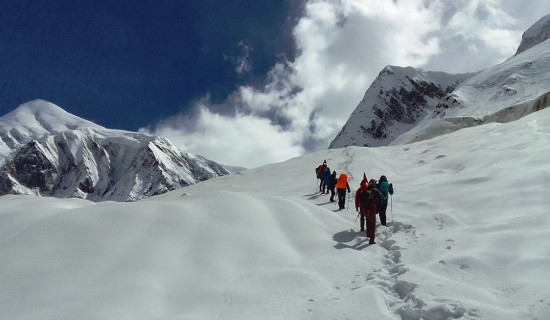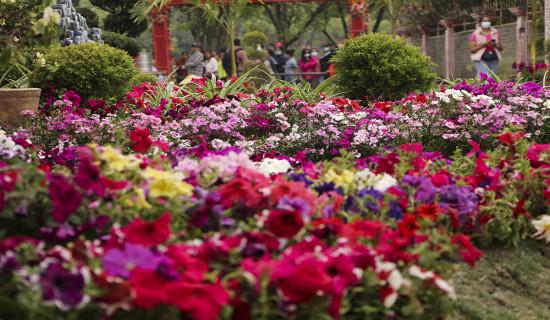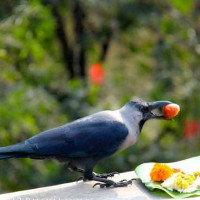- Sunday, 19 October 2025
Gaushala at old landfill site turns haven for stray cows
By Phadindra Adhikari, Lekhnath, Dec. 5: More than 300 cows are now in Pushkarini Paropakar Gokul Dham (Gaushala). The Gaushala (place to keep cows) has two large and two small sheds, along with a storage building. The surroundings are well-fenced with paved pathways where young calves playfully run around. People visit the Gaushala to observe the calves and the cows.
Located on the banks of the Seti River in Bachhebuduwa, Pokhara-14, the Gaushala once was a dumping site. But now the site has turned into a haven for the cows after the National Philanthropic Association (Rastriya Paropakar Mahasangh) built the modern Gaushala just in seven months.
The landfill site was near the Pokhara International Airport, so it was closed before the airport was brought into operation, as the landfill site could lead to increased activities of vultures. President of the Philanthropic Association, Kamal Nayan Gautam, envisioned a solution to these issues and planned to build the Gaushala in the area encroached by the landfill site.
The municipal council approved Gautam's plan seven months ago. Now many cows have been relocated to the newly built sheds.
The remaining construction and management works of the Gaushala are scheduled to be completed next year.
Gautam, said, "Now, there are no hungry, sick, or dying cows and calves in Pokhara Metropolis. We are not just saving the abandoned cows; we are also showcasing exemplary work here."
Till now, Rs. 30 million has been spent to build the Gaushala.
Last year, Pokhara Metropolitan City allocated Rs. 5 five million for the construction of the Gaushala. Some of the remaining funds have been contributed by the Philanthropic Association, and some donors have also assured support. According to Gautam, they have a plan to make the Gaushala economically self-reliant
Currently, the cows kept in the Gaushala produce 50 litres of fresh milk a day. Gautam emphasises, "Our main focus is to manage dung and urine. Our capacity is limited, and rather than managing all the cows, we want to emphasise the importance of cow management and create an environment for everyone to raise cows at home."
As stray cattle often cause accidents, Dhanaraj Acharya, the Mayor of the metropolis, supported the plan of building the Gaushala. The metropolis has made a special vehicle (Animal Rescue Vehicle) to transport injured animals and has prohibited people from releasing their cows on the road.
"We have seen cows being released on the road, therefore a separate area like this Gaushala is needed to manage these animals. We are building this which can also be transformed into a tourist destination," he said.
Two ropanis of land was allocated for the construction of the Gaushala. Grass and saplings are planted to feed the cows whereas production of organic vegetables has also begun on the 10 ropanis of land using the manure produced in the Gaushala.
There is also a goal is to turn this cow shelter into a study and observation site. Gautam, the president of the Association, said, “It can be converted into a research centre, and we plan to educate about the agricultural system, promote it, and inspire everyone to engage in agriculture.”
By keeping 25 to 30 traditional buckets, we aim to teach people how to milk the cow. The Gaushala also aims to rear all breeds of cows found in Nepal.
















